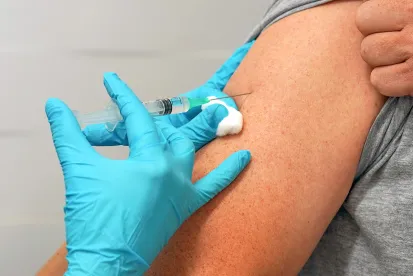New Jersey is requiring employers in covered healthcare and high-risk congregate settings (“covered settings”) to establish a policy that: (1) mandates vaccinations or weekly testing for workers; (2) creates a system to track the results of the applicable testing requirements; and (3) creates a system to communicate the results of such testing to local public health departments.
Executive Order 252 (EO 252), issued by Governor Phil Murphy on August 6, 2021, takes effect on September 7, 2021. Employers in the “covered settings” must ensure adequate policies, privacy protections, and training or education procedures are in place to comply with the mandate.
Covered Settings
EO 252 covers a wide variety of settings, ranging from hospitals to adult daycare to correctional facilities. “Covered settings” are defined as:
Healthcare facilities:
-
Acute, pediatric, inpatient rehabilitation, and psychiatric hospitals (including specialty hospitals, and ambulatory surgical centers);
-
Long-term care facilities;
-
Intermediate care facilities;
-
Residential detox, short-term, and long-term residential substance abuse disorder treatment facilities;
-
Clinic-based settings (e.g., ambulatory care, urgent care clinics, dialysis centers, Federally Qualified Health Sites, family planning sites, and opioid treatment programs);
-
Community-based healthcare settings (e.g., Program of All-Inclusive Care for the Elderly, pediatric and adult medical daycare programs, and licensed home health agencies and registered health care service firms);
High-risk congregate settings:
-
State and county correctional facilities;
-
Secure care facilities operated by the Juvenile Justice Commission;
-
Licensed community residences for individuals with intellectual developmental disabilities (IDD) or traumatic brain injuries (TBI);
-
Licensed community residences for adults with mental illness;
-
Certified day programs from individuals with IDD or TBI; and
-
Certain long-term care facilities subject to prior New Jersey Department of Health Executive Directives.
EO 252 does not mention office settings. Instead, it appears to focus primarily on settings where larger numbers of individuals may be present.
Requirements
By September 7, 2021, covered settings must establish a policy that requires “covered workers” to:
-
Provide adequate proof of full vaccination; or
-
Submit to testing (one to two times per week at a minimum).
Covered workers who are not fully vaccinated or have not provided adequate proof of vaccination by September 7, 2021, must submit to the testing protocol on an ongoing basis or until fully vaccinated.
Covered Workers
EO 252 expressly applies not only to employees (full-time or part-time), but to contractors and any other individuals working at the covered setting, including individuals providing operational or custodial services or administrative support. Arguably, other individuals working in covered settings may be covered by the requirements. These may include vendors, outside entities, and third-party providers who perform occasional or temporary services in a covered setting (e.g., third-party security services, technicians, and repairpersons).
While EO 252 does not address whether individuals occasionally visiting a site for commercial purposes (e.g., sales and meetings between companies) fall within its requirements, the conservative approach may be to require all individuals at a covered setting for commercial purposes also comply.
Vaccine, Proof
A covered worker is considered “fully vaccinated” two weeks or more following the administration of a second vaccine dose in a two-dose series or two weeks or more after a single dose vaccination. Any administered vaccine must be authorized for emergency use by the Food and Drug Administration or the World Health Organization.
Acceptable proof for vaccination status includes:
-
The Centers for Disease Control and Prevention COVID-19 Vaccination Card issued by the vaccination site (or an electronic or physical copy of the card);
-
An official record from the New Jersey Immunization Information System (or other state registry);
-
A record from a healthcare provider’s portal or record system on official letterhead, signed by a licensed physician, physician assistant, nurse practitioner, registered nurse, or pharmacist;
-
A military immunization record from the Armed Forces; or
-
A docket mobile phone application record or any state specific application that produces a digital health record.
Certifications alone will not satisfy the proof requirement. Covered settings must implement appropriate safeguards to protect the health information provided. If a worker’s vaccination status is unknown or the worker fails to provide adequate evidence of vaccination, the covered setting must treat the individual as unvaccinated for purposes of the policy.
Testing Option
Starting September 7, 2021, any unvaccinated covered worker in a covered setting must submit to testing at least one to two times per week. The worker may choose an antigen or molecular test, if the test is approved by the Food and Drug Administration, or tests operating pursuant to the Laboratory Developed Test requirements provided by the U.S. Centers for Medicare and Medicaid Services. If the covered setting offers access to testing, it may choose the antigen or molecular test. While silent on the issue, the covered worker presumably may choose whether to submit to testing through the covered setting or at a testing provider of their choice. If a covered worker is not working on-site at the covered setting during a week when testing would otherwise be required, the worker is not required to submit to testing that week.
The covered setting also must establish a policy for recording test results and report those results to its local health department. Healthcare employers should maintain vaccination records and testing results in a separate medical file, apart from any medical file that may be otherwise maintained by the employer.
EO 252 states that its requirements constitute only a floor and that covered settings may promulgate more stringent requirements or more frequent testing. While not discussed in EO 252, issues regarding accommodations (including medical or religious accommodations) are presumably within the ambit of the order’s weekly testing alternative.
Furthermore, EO 252 may present issues regarding privacy (e.g., recording and transmission of protected health information), employee pay (e.g., compensability of time spent completing tests and cost of tests), and other matters that will require covered employers to move quickly to prepare compliant policies.







 />i
/>i
